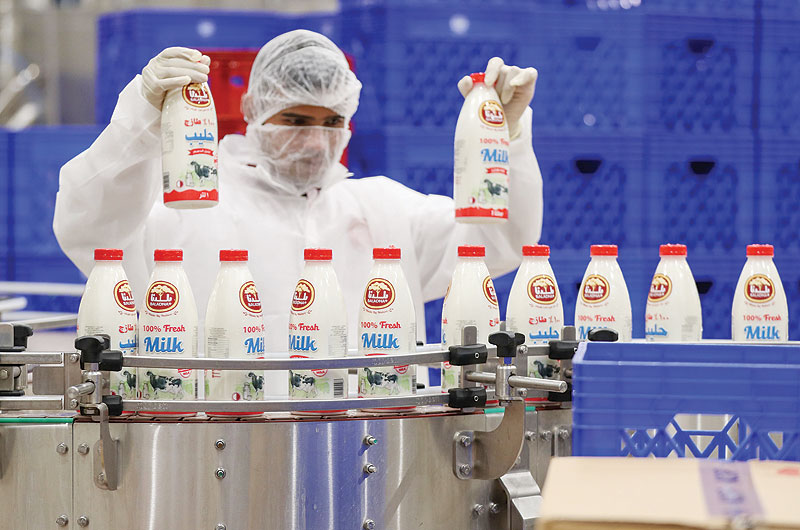
DOHA: The cows of Qatar’s Baladna farm, housed in climate-controlled farms in the desert, exemplify the lengths to which Qatar has gone to resist what it calls an economic “blockade” enforced by its Saudi-led neighbors. When the boycott began in June 2017, Qatar responded with sweeping measures, like liquidating a quarter of its cash reserves to steady the economy and its currency, but it also flew in hundreds of Holstein cows.
The new herd was part of a plan to establish food security in the event that import routes were blocked - concerns that had seen supermarket shelves emptied in the opening days of the embargo. This week, Baladna will finish listing 75 percent of the company on the Doha stock exchange, allowing Qatari investors to own part of the Gulf nation’s embargo fightback. “We were driven to do this by our commitment to provide Qatar with a fresh and steady supply of dairy products,” said Baladna farm’s vice-chairman Ramez Al-Khayyat.
The company now meets more than 90 percent of the country’s fresh dairy needs from its farm 55 km north of Doha. Rows of cows are gently cooled through a system of giant fans and vents that spray a fine mist as they move between feeding and milking barns. The herd, now grown to 18,000 strong, is fed hay imported from Europe and the United States.
With Baladna’s growth, Qatar is now looking to its nascent dairy industry to play a role in the drive to diversify the economy away from oil and gas. Baladna stock will initially only be on offer to Qatari individuals and companies, but bosses are still hoping to raise around $390 million for three-quarters of the company’s shares. Foreigners will be able to own up to 49 percent of shares from an unspecified future date.
The sale is dwarfed by neighboring Saudi Arabia’s plans to list part of oil giant Aramco, expected to be the biggest ever stock market flotation, but it represents an important landmark for Qatar’s fledgling dairy industry. Khayyat told AFP the listing would make Baladna “more sustainable, even for the future after the illegal blockade is eased”. But the embargo enforced by Saudi Arabia, the United Arab Emirates, Egypt and Bahrain shows no signs of abating, prompting Baladna to expand its product range to include juices, cheeses and yoghurt in recent months.
The Riyadh-led alliance has accused Doha of backing Islamist groups and Iran, issuing a raft of terms Qatar must accept before it will lift the embargo that includes a ban on direct air, land or sea trade. Doha strongly denies the allegations and has refused to meet the demands that also stipulate the closure of its flagship state-run Al Jazeera broadcaster.
Qatar, with a population of 2.7 million, has also turned to countries including Turkey, Iran and Morocco to replace supply chains severed by the embargo. “There’s great interest from strategic investors - they’ve taken 23 percent,” said a source briefed on the IPO. They include Qatar’s government pension fund and a subsidiary of the sovereign wealth fund. Qatar’s industry ministry will hold a “golden share”, allowing it to appoint some directors and veto certain decisions. Baladna’s founders will hold the quarter of the company not on offer.
The company hopes the remaining 52 percent of shares will be snapped up in the final days of the purchase window, which closes today. Trading will begin on Dec 11. Market-watcher M R Raghu said the company’s growth prospects, “underpinned by strong regulatory support in addition to its discounted valuation”, made the stock an attractive prospect. “Supportive government policies are expected to put the company at an advantage to competitors,” added Raghu, head of research at the Kuwait Financial Centre (Markaz), referring to subsidized land, among other measures.
The IPO, expected to be the only such indigenous offering this year, has been heavily publicized. Glossy ads have appeared on YouTube showing truckloads of cattle being transported from Qatar Airways cargo planes to their vast desert barns. - AFP

